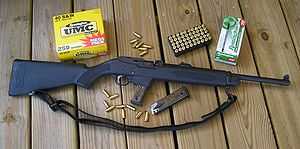Ruger Police Carbine
| Ruger Police Carbine | |
|---|---|
 Ruger PC4 | |
| Type | Carbine |
| Place of origin |
|
| Production history | |
| Designed | 1996[1] |
| Manufacturer | Sturm, Ruger & Co. |
| Produced | 1996-2006[1] |
| Variants | PC9, PC4 |
| Specifications | |
| Weight | 7 lb (3.2 kg)[2] |
| Length | 34 in (860 mm)[2] |
| Barrel length | 16.24 in (412 mm)[2] |
|
| |
| Cartridge | 9×19mm, .40 S&W[2] |
| Action | Blowback |
| Feed system | 10 or 15 round P series box magazine[2] |
| Sights | Ghost ring rear, Blade front |
The Ruger Police Carbine is a pistol caliber carbine designed as a companion to the Ruger P Series pistols. As of 2007, Ruger has discontinued production citing low demand. It is a semi-automatic carbine using a blowback action. The Carbine uses the same ammunition and magazines as the Ruger P Series 9mm and .40 S&W caliber pistols.
Both the PC9 (the 9mm version) and the PC4 (.40 S&W) are patterned after the highly successful Ruger 10/22 carbine. The Carbine is intended as a shoulder weapon for police use, although it is available for sale to civilians as well. The intent is that an officer will carry a Ruger P Series pistol as a sidearm, and keep a Carbine available (for example, in his/her patrol vehicle) as a shoulder weapon if needed. Since the carbine has a 16-inch (410 mm) barrel, it provides more power with the same ammunition used by the 4-inch (100 mm) barreled pistol (see internal ballistics). The carbine also provides additional accuracy and range over the pistol.
The Carbine has some unique design features. The action is a simple blowback design, which requires a fairly massive bolt to handle the pressure of 9mm and .40 S&W. To prevent the gun from being too unbalanced by the large bolt, the bolt consists of two parts; the main body of the bolt is fairly light and located in the receiver, while the other part is just a weight located under the forend of the carbine. These two parts are held together by strong, rigid steel bars. The combined mass serves to hold the breech safely closed during firing, while keeping the center of gravity forward, so the gun handles well. Another unique feature is the bolt lock. Since blowback guns of these calibers require heavy bolts, the inertia of dropping the gun can cause the bolt to come partially open, rendering the gun unfirable until the bolt is manually closed all the way. To prevent this, the Carbine uses a lock that locks the bolt securely closed so that a fall will not dislodge it. A slight pressure on the trigger or on the bolt handle, however, will disengage the bolt so that it can move for firing or clearing the action.
In addition to caliber, the Carbine also comes with a choice in sights. The standard model uses notch and post sights, while the GR models are equipped with ghost ring sights. The ghost ring sights cost more, but they are generally considered better for defensive purposes, as they allow faster sighting under poor lighting conditions plus a longer sight radius for greater potential accuracy. The Carbine also has Ruger style scope bases built into the receiver, allowing optical sights to be easily and securely mounted.
References
External links
| ||||||||||||||||||||||
